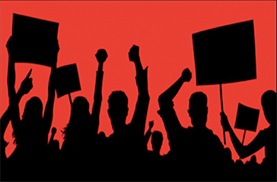Originally Posted by PublicKnowledge.org

By Willmary Escoto
Democracy has become a daily visceral online experience. When Philando Castile was shot by a Minnesota police officer his girlfriend’s first instinct was to start broadcasting. Diamond Reynolds chose to live-stream the aftermath of the shooting on Facebook Live, sharing the graphic cries of her four-year-old daughter with over 3.2 million viewers. Live streaming is transforming the growth of citizen journalism, providing a distressing view of shootings like these, and empowering citizens to share their story without the fear of censorship.
 The apparent perpetuation of racial injustice in America is not new to minorities. One of the most important democratizing effects of an open internet is its emancipatory impact on underrepresented groups. It enables impoverished communities to bring to light the social injustices that were once in the shadows. The expansion of this movement and its capability to respond rapidly and effectively to the brutal and biased policing of Black, Latino, LGBT, and other minority groups depends, in part, on access to a non-discriminatory internet. The internet plays a critical role in the dissemination of information and services specifically tailored for people of color and other marginalized groups, including LGBT people, because it provides the opportunity for us to tell our own stories and to organize for racial and social justice. That empowerment relies on an open internet and net neutrality.
The apparent perpetuation of racial injustice in America is not new to minorities. One of the most important democratizing effects of an open internet is its emancipatory impact on underrepresented groups. It enables impoverished communities to bring to light the social injustices that were once in the shadows. The expansion of this movement and its capability to respond rapidly and effectively to the brutal and biased policing of Black, Latino, LGBT, and other minority groups depends, in part, on access to a non-discriminatory internet. The internet plays a critical role in the dissemination of information and services specifically tailored for people of color and other marginalized groups, including LGBT people, because it provides the opportunity for us to tell our own stories and to organize for racial and social justice. That empowerment relies on an open internet and net neutrality.
Net neutrality prevents Internet Service Providers from interfering with, blocking, or discriminating against Web content. Unfortunately, in April 2017, current FCC Chairman Ajit Pai announced plans to undo those rules and strip consumers of those critical online protections. Chairman Pai specifically proposed to remove the internet’s classification as a public utility under Title II of the Communications Act.
Digital advocacy groups who oppose Chairman Pai’s proposal fear his approach will empower giant ISP gatekeepers and jeopardize net neutrality and free speech for disadvantaged populations, including people of color living in low-income communities who depend on equitable high-speed internet to tell their stories. Carmen Scurato, director of policy and legal affairs for the National Hispanic Media Coalition‘s affirmed that:
“Dismantling net neutrality opens the door for corporations to limit free expression, organizing efforts, educational opportunities and entrepreneurship by imposing a new tool to access information online. […]For Latinos and other people of color, who have long been misrepresented or underrepresented by traditional media outlets, an open Internet is the primary destination for our communities to share our stories in our own words—without being blocked by powerful gatekeepers motivated by profit.”
According to David Uberti of the Columbia Journalism Review:
“In most cases […] law enforcement’s point of view tends to dominate stories, as eyewitnesses might not be available or willing to talk, and victims – in the most violent cases – might be severely injured or dead. But smartphone video footage is changing the dynamic in a growing number of instances.”
The egalitarian quality of an open and accessible internet furthers the fundamental goals of civic engagement and free speech. The Black Lives Matter movement started with a simple hashtag, #BlackLivesMatter, and it has transformed the dialogue surrounding police brutality and inequality. In an article in the Hill, co-founder of Black Lives Matter, Patrisse Cullors said:
“Black Twitter broke the story of the murder of an unarmed teenager, Michael Brown, in Ferguson, Missouri by police officer Darren Wilson, while consolidated broadcast and cable industries lagged behind. From unarmed Black father John Crawford, murdered by police in an Ohio Walmart, to Aiyana Stanley-Jones, a Black 7-year-old murdered by police while she slept in her home—the open Internet allowed Black communities to tell these stories with our own voices.”
The audiovisual truth of Alton Sterling and Eric Garner’s public executions were undeniable and accessible because of the current net neutrality rules in place. ISPs are unable to control Twitter dissent, or block profiles reporting police brutality and access to video footage, thanks to the net neutrality. Activists can turn to the internet to circumvent cable, broadcast, mainstream, and print outlets improper characterizations of disenfranchised and marginalized communities, because of an open and accessible internet. The current rules safeguard disadvantaged communities of color and America’s poor by ensuring that internet providers – upon whom we all rely to have our voices heard – treats all data on the internet the same.
In 2017, it is not just one movement, but every purpose that benefits from the ability to vibrantly and rapidly spread their message over a free and open internet. We watched the Women’s March explode from an idea on Facebook to a nationwide and global movement. Groups mobilizing in support of a Supreme Court nominee find an avenue to speak online just as well as leaders mobilizing mass protests against the Muslim ban and the immigration crackdowns. Conservative groups in rural America have found a voice online as well. In all cases, the American people have used the internet to mobilize and organize resistance against an increasingly heightened democratic dialogue. Millions have been able to mobilize so quickly because they have the ability to use the open internet to communicate to the masses and organize a resistance.
When Americans have protections for the proliferation of democratic discourse and civic engagement, we all benefit. It is our duty to ensure those protections aren’t dismantled and to protect our communities from the discriminatory practices of telecommunications companies. We can’t allow the Trump administration and Chairman Pai to eliminate net neutrality and consumer protections that affect us all. Internet users cannot allow ISPs and other broadband providers to deliver substandard internet service to our communities.
Net neutrality is the beginning of a larger conversation on the future of the internet. The internet fosters mobilization for progressive and social change, and as advocates for social justice we must protect the internet from transitioning into a utility of privilege. The clock is ticking and the time is now. Gigi Sohn, one of the major net neutrality advocates who helped in crafting the FCC’s current Open Internet Order, published helpful advice for those who want to get involved. As the United States transitions towards this internet-based communications network revolution, we must remain focused on the right goals: ensuring that the internet is affordable and accessible for all, not just the privileged.
Digital social justice demands no less.

Author, Willmary Escoto
